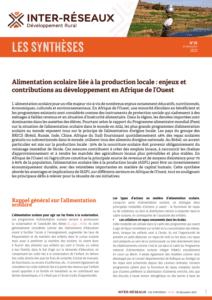Supporting farmer-driven investments in agricultural water management
Main findings and recommendations
Smallholder irrigation could change the lives of millions of people
Smallholder farmers in sub-Saharan Africa and South Asia are increasingly using small-scale irrigation to cultivate their land. Individually owned and operated irrigation technologies improve yields, reduce risks associated with climate variability and increase incomes, allowing farmers to purchase food, health care and education. There is great potential for many more farmers to benefit from small-scale irrigation. This report presents governments, donors, lending institutions, the private sector and farmers with the opportunity to make well-informed decisions about investments in agricultural water management (AWM) that could change the lives of millions of rural people.
Small-scale AWM is outpacing the use of large-scale irrigation
The proliferation of small-scale private irrigation is an established trend in South Asia that is now gaining ground in sub-Saharan Africa. In many African countries, water management by smallholders is already more important for irrigation than the public irrigation sector, in terms of the number of farmers involved, the area covered and the value of production. For example, in Ghana, private irrigation by smallholders employs 45 times more individuals and covers 25 times more land than public irrigation schemes.
Water at the right time can make a big difference to farmers’ incomes and nutrition
Small-scale private irrigation provides millions of poor farmers with additional income during the dry season. Having access to water at this time means they can cultivate crops and earn money outside of the main season when other agricultural opportunities are limited. In Madhya Pradesh, incomes of farmers who constructed on-farm ponds to irrigate pulses and wheat have risen by more than 70%; as a result, they have also been able to improve and expand their livestock herds. In Tanzania, half of the dry-season cash incomes of smallholders come from growing irrigated vegetables. In Zambia, the 20% of smallholders who cultivate vegetables in the dry season earn 35% more than those who do not.
Smart investments in AWM could benefit farmers across sub-Saharan Africa
As small-scale water management technologies become more accessible, the potential to expand private irrigation is enormous. This is especially so in sub-Saharan Africa, where there is significant scope to extend the area of land that is irrigated or under improved agricultural water management. Investment costs of small-scale irrigation technologies are affordable, and implementation is relatively straightforward when compared to large-scale irrigation, so the potential for up-scaling and reducing poverty is high. For example, investments in dry-season irrigation for rice could improve yields between 70% and 300% across sub-Saharan Africa. Investments in motorized pumps, specifically, could benefit 185 million people and generate net revenues up to USD 22 billion per year. In Tanzania, investments to improve community-managed irrigation schemes are resulting in income and yield improvements on a par with government-managed irrigation schemes, but at a lower cost. Similarly, on-farm rainwater management and conservation agriculture could yield significant returns.
New investments would be supporting an existing, farmer-driven trend
Smallholder farmers demonstrate a genuine interest by financing and installing irrigation technologies and investing their own resources in their agricultural businesses. Small-scale AWM could expand significantly if farmers were able to overcome key constraints, such as high upfront investment costs; poorly developed supply chains; high taxes and transaction costs; difficulty accessing information and knowledge on irrigation, seeds, marketing, equipment and other inputs; and imbalances of power that leave farmers at a disadvantage when selling their produce.
Smallholder AWM lacks supportive institutional structures
The adoption of small-scale irrigation technologies by many individual farmers is a new dynamic, which presents opportunities and challenges that differ from conventional irrigation development. Smallholder AWM requires new organizational models because existing governing bodies concerned with water management are often not adapted to handle the challenges posed by this alternative, dispersed mode of supplying water. Irrigation departments tend to oversee large-scale canal irrigation, while agricultural departments are concerned with rain-fed farming. Small-scale private irrigation falls between the two and, therefore, lacks an institutional ‘home’. As a result, opportunities for improving small-scale private irrigation are often lost.
Un-regulated and expanding small-scale irrigation poses new challenges
Small-scale private irrigation poses several challenges related to social equity and environmental sustainability. First, poor farmers (often women and young people) cannot always afford the upfront investment costs for AWM technologies and the associated agricultural investments needed to generate higher profits. While all farmers face agricultural risks, poorer farmers are often less able to access resources and assume proportionally larger financial risks. Second, investments in irrigation, whether small-, medium- or large-scale, are associated with the relatively more intense use of agrochemicals, which can have a negative impact on water resources and food safety. Finally, competition between upstream and downstream users, and the depletion of groundwater, may be aggravated by the unchecked or un-regulated nature of small-scale private irrigation.
To read the report : http://www.iwmi.cgiar.org/Publications/Other/Reports/PDF/Water_for_wealth_and_food_security.pdf







